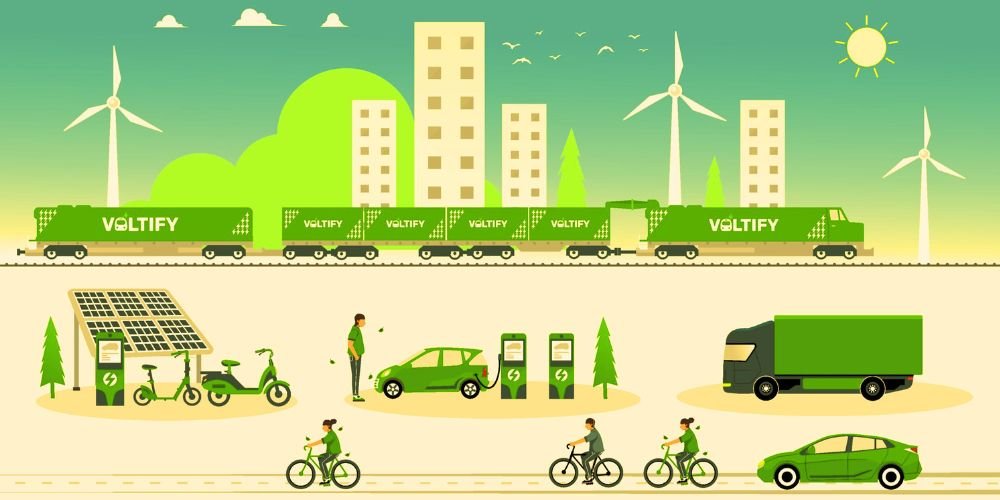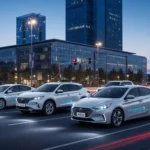Transportation sustainability has become a pressing imperative in the global effort to address environmental challenges and build a more eco-friendly future. This comprehensive exploration delves into the intricacies of transportation sustainability, unraveling its fundamental principles, key components, recent innovations, notable applications, and transformative impact on creating a greener and smarter mobility ecosystem.
Understanding Transportation Sustainability
Transportation sustainability involves adopting practices and technologies that minimize the environmental impact of transportation systems. The goal is to balance meeting the growing demand for mobility and reducing carbon emissions, pollution, and resource depletion associated with traditional transportation methods.
Key Components of Transportation Sustainability
The core components of transportation sustainability contribute to its functionality, efficiency, and overall impact on creating a greener mobility ecosystem:
- Alternative Fuels: The transition from fossil fuels to alternative, cleaner energy sources such as electricity, hydrogen, and biofuels is a key component of sustainable transportation. This shift aims to reduce greenhouse gas emissions and dependence on finite resources.
- Public Transportation: Promoting and investing in public transportation systems, including buses, trains, and trams, helps reduce the number of individual vehicles on the road. This decreases traffic congestion and lowers emissions per passenger.
- Active Transportation: Encouraging walking, cycling, and other forms of active transportation reduces reliance on motorized vehicles, improving air quality, reducing traffic congestion, and enhancing public health.
Recent Innovations in Transportation Sustainability
Recent innovations have elevated transportation sustainability to new heights, addressing key challenges and pushing the boundaries of performance. Notable advancements include the integration of smart technologies and the rise of shared mobility solutions.
Smart Technologies in Transportation
Integrating smart technologies, including Internet of Things (IoT) devices and data analytics, enhances the efficiency of transportation systems. Smart traffic management, predictive maintenance, and real-time monitoring contribute to optimized routes, reduced emissions, and improved overall sustainability.
Rise of Shared Mobility Solutions
The emergence of shared mobility solutions, such as ride-sharing, car-sharing, and bike-sharing, promotes more efficient resource use and reduces the overall number of vehicles on the road. These solutions contribute to lower emissions, decreased traffic congestion, and increased accessibility to transportation services.
Notable Applications of Transportation Sustainability
Transportation sustainability extends beyond environmental conservation, influencing aspects of urban planning and societal well-being.
Eco-Friendly Urban Planning
Sustainable transportation practices influence urban planning by prioritizing pedestrian-friendly designs, efficient public transit networks, and the integration of green spaces. This approach enhances livability, reduces urban sprawl, and fosters a healthier environment for residents.
Corporate Sustainability Initiatives
Many corporations adopt sustainable transportation practices as part of their broader environmental initiatives. Companies are investing in electric vehicle fleets, promoting telecommuting, and encouraging sustainable commuting options to reduce employees’ carbon footprints.
Challenges in Transportation Sustainability
Despite significant advancements, transportation sustainability faces challenges that impact its widespread adoption and effectiveness. Addressing these challenges is crucial for continuously improving and integrating sustainable transportation practices into our infrastructure.
Infrastructure Gaps
Insufficient infrastructure for alternative fuels, electric charging stations, and dedicated cycling lanes challenges the widespread adoption of sustainable transportation. Investments in expanding and improving infrastructure are essential to supporting the transition to greener mobility.
Behavioral Changes
Encouraging individuals to adopt sustainable transportation habits requires significant behavioral changes. Overcoming resistance to new modes of transportation, such as cycling or public transit, involves effective communication, incentives, and education.
Future Trends in Transportation Sustainability
The trajectory of transportation sustainability indicates exciting trends that will further redefine its capabilities and applications. These trends promise to enhance environmental conservation, improve efficiency, and contribute to the overall well-being of transportation systems.
Electrification of Freight Transportation
The electrification of freight transportation, including electric trucks and delivery vans, is gaining traction as a key element of sustainable logistics. Electric freight vehicles contribute to lower emissions, reduced noise pollution, and a more sustainable supply chain.
Integration of Renewable Energy Sources
Integrating renewable energy sources, such as solar and wind power, into transportation infrastructure contributes to a more sustainable energy ecosystem. Charging stations powered by renewable energy reduce electric vehicles’ carbon footprint.
Sustainable Aviation Solutions
The aviation industry is exploring sustainable alternatives, including electric and hybrid aircraft, to reduce environmental impact. Innovations in sustainable aviation technologies aim to make air travel more eco-friendly and energy-efficient.
Conclusion
Transportation sustainability is pivotal to the ongoing efforts to create a greener, smarter mobility ecosystem. From alternative fuels and shared mobility solutions to smart technologies and corporate sustainability initiatives, the impact of these practices extends beyond reducing emissions and influencing urban planning and corporate cultures. Despite challenges, ongoing innovations in smart technologies, shared mobility, and renewable energy integration signal a promising future for transportation sustainability. As research and development continue to push the boundaries of what is possible, transportation sustainability is poised to become a driving force in shaping a more eco-friendly, efficient, and technologically advanced transportation future.





